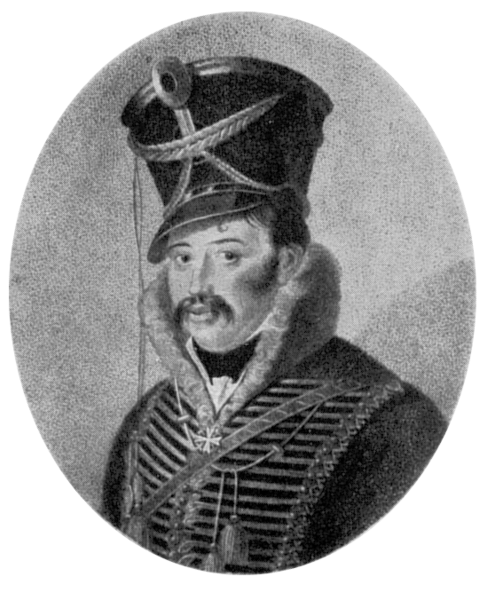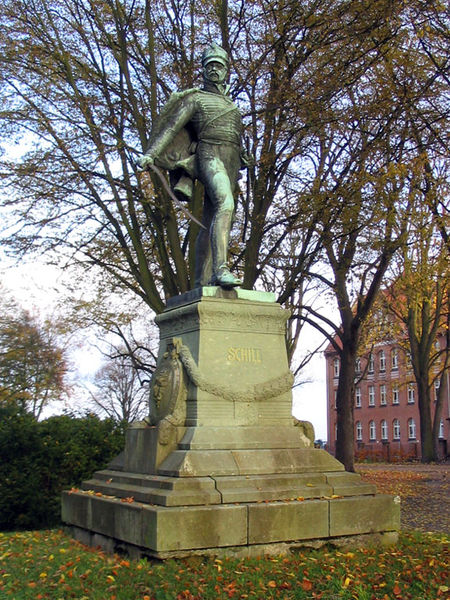<Back to Index>
- Surgeon Percivall Pott, 1714
- Composer Alexander Nikolayevich Scriabin, 1872
- Major of the Prussian Hussars Ferdinand Baptista von Schill, 1776
PAGE SPONSOR


Ferdinand Baptista von Schill (6 January 1776 – 31 May 1809) was a Prussian officer who revolted unsuccessfully against French domination in May 1809.
Schill was born at Wilmsdorf (now a part of Bannewitz, Saxony) and entered the Prussian Army's cavalry at the age of twelve or fourteen (sources differ). His father, Johann - Georg Schill, had been an ambitious commoner from Bohemia, who attained the aristocratic "von" for his services to Austria and Saxony during the Seven Years' War. J.G. von Schill had raised a "Freikorps", a small raiding party of cavalry and mounted infantry, operating behind enemy lines, and acquired some measure of fame and success. Many of Ferdinand von Schill's later biographers assumed that his father's example was an important influence on his subsequent career.
Ferdinand von Schill was a second lieutenant of dragoons when he was wounded at the battle of Auerstadt. From that field he escaped to Kolberg, where he played a very prominent part in the celebrated siege of 1806 – 07, as the commander of a Freikorps, raiding behind the French lines. After the Treaty of Tilsit, he was promoted to major and given the command of a hussar regiment formed primarily from his Kolberg men. In
1809 the political situation in Europe appeared to Schill to favor an
attempt to liberate Germany from the French domination of Napoleon Bonaparte. He was an active member of the Tugendbund, the quasi-Masonic "League of Virtue" founded in June 1808, and including many notable Prussian reformers such as Gerhard von Scharnhorst and August Neidhardt von Gneisenau. It was banned in 1809. Many Tugendbund leaders believed that the new Kingdom of Westphalia, created by Napoleon from many smaller German states, and ruled by Napoleon's youngest brother Jérôme Bonaparte,
was ripe for revolution. Schill planned to create an uprising in
Westphalia that would topple the Bonaparte regime there, and – coupled
with the efforts of Austria, Spain, and Britain – would bring about the
fall of Napoleonic dominance in Germany. Leading
out his regiment from Berlin under pretext of manoeuvres, he raised the
standard of revolt, and, joined by many officers and a company of light infantry, marched first south through Saxony, and then north-west into Westphalia. At the village of Dodendorf on May 5, 1809, he had a brush with the Magdeburg garrison
and won a small victory. Schill had no difficulty defeating, or even
recruiting, the unreliable Westphalian troops sent against him, and his
rebellion swelled to over 2,000 men. He had less success, however, with the gathering Danish and Dutch forces, which gradually drove him in a north-east direction toward the Baltic Sea. His most serious difficulty was the condemnation of Prussia's king Frederick William III,
who feared that the revolt would drag a weakened and unprepared Prussia
into another disastrous war against Napoleon. By the end of May,
although he had left garrisons and raiding parties in various places,
Schill's main force was trapped at Stralsund. He had between 1,500 – 2,000 men, against a force of 8,000 Danish and Dutch troops under French command.
On
May 31 the Napoleonic forces stormed Stralsund. Schill was killed in
the street fighting as his defenses collapsed. Over a thousand of his
rebels escaped to Prussia, overland or by ship, where the officers were
tried by court-martial, cashiered and imprisoned (although all were
subsequently pardoned.) Some smaller parties of rebels escaped to
Sweden, and ultimately Austria and Britain, but the rest were either
killed or taken. The French commander counted 570 prisoners, the
majority of whom were then sent to the galleys. About 100 rebels who
had been Westphalian deserters were separated and taken to
Brunswick, where 14 of them were ultimately executed. Eleven of Schill's officers were taken by Napoleon's orders to the fortress of Wesel where they were given a show trial and executed on September 16. Schill's
body was decapitated. The corpse was dumped in an unmarked grave in
Stralsund. The head was sent to Jérôme Bonaparte as a
trophy, but he gave it to a Dutch surgeon who collected oddities, and
it remained at the University of Leiden until 1837, when German patriots obtained it for the dedication of a Schill monument in Brunswick. By
the 1830s Schill was widely considered a hero throughout Germany.
Monuments and historical markers to him or to his rebels have been
erected in towns and cities: Wesel, Stralsund, Braunschweig, Wilmersdorf, Potsdam, Ohlau, Cottbus, Anklam, Geldern, and Wittenberg. Military
units were named after him, streets and plazas bear his name to this
day. Over 400 biographies, novels, plays, operas, and collections of
poetry have been published about him in German, and he is featured in
over a dozen German films.